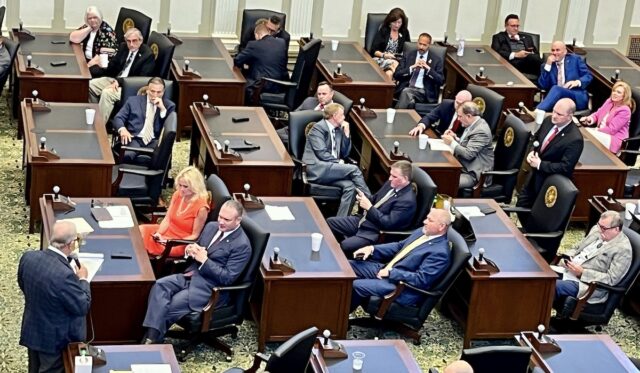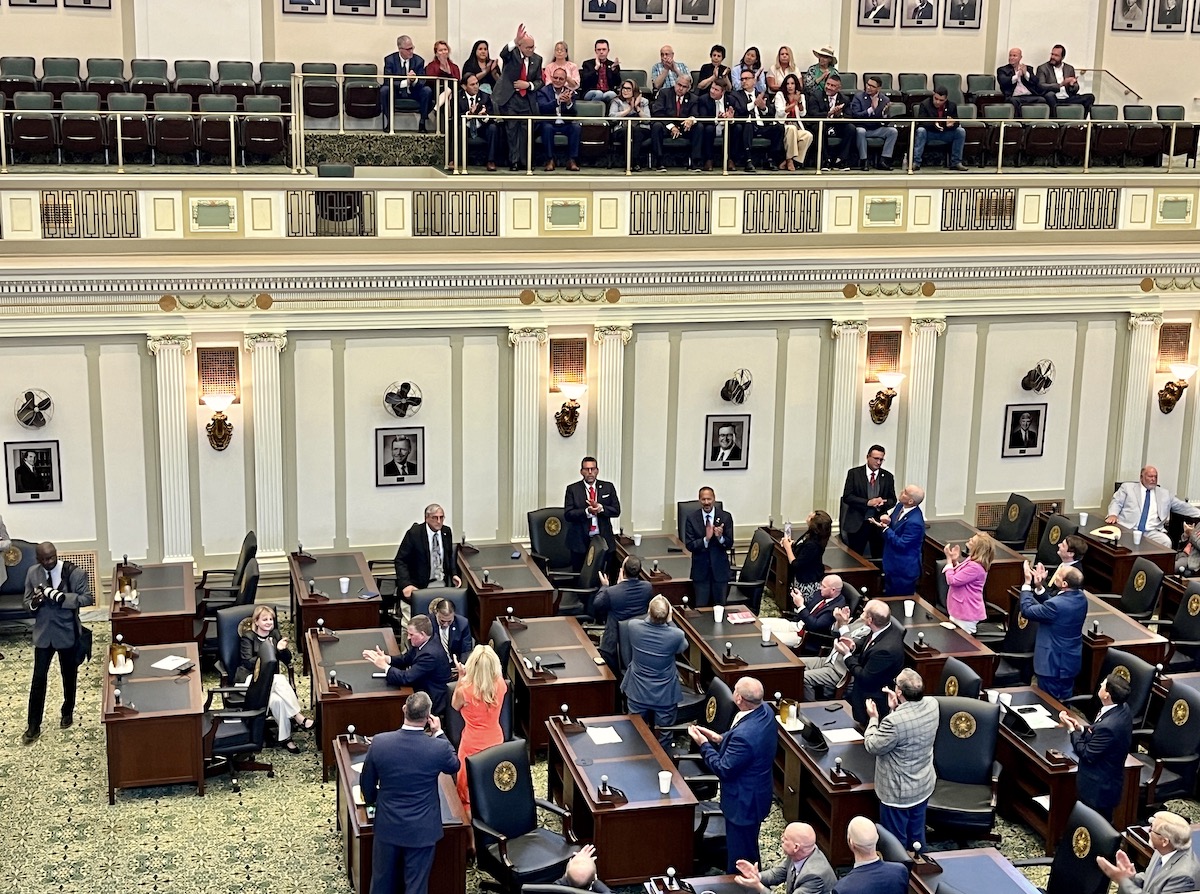
The Oklahoma Legislature’s self-called special session concluded today with the House taking a final vote to culminate the override of Gov. Kevin Stitt’s veto on a bill extending state-tribal tobacco compacts by one year through Dec. 31, 2024.
But underscoring the significant tension between his office, legislative bodies and tribal leaders, Stitt responded quickly by asking the Oklahoma Supreme Court to declare a pair of compact-extending bills “void” and rule that the governor’s office is vested with statutory and constitutional authority to negotiate state-tribal compacts.
“This unprecedented action is about raw legislative power, which must be checked for our state’s governmental framework to continue as designed,” Stitt’s general counsel wrote in his petition. “Respectfully, this case is not about any qualms the Legislature — or anyone else — may have about petition or his negotiation style. Whatever the Legislature’s powers are in the contexts at issue, they assuredly do not include any authority to negotiate, amend, and extend compacts rightly entered by prior governors. But that is exactly what the Legislature has done through purported enactment of SB 26X and [HB 1005X].”
Prior to Stitt announcing his lawsuit, House Speaker Charles McCall (R-Atoka) said Monday’s veto override vote signaled that the Legislature wants the governor to have serious “good faith” negotiations with tribal leaders.
“What I like about where we are today, it’s not about whether we overrode the governor’s veto or not. What I think is good for the state of Oklahoma is that we’re having dialogue, we’re having discussion,” McCall told media Monday. “Those offers only came into existence from the governor to these tribal nations after this legislation was introduced. It truly was the catalyst for the dialogue, and so I’m optimistic that we’re going to move forward and find the best deal, the best agreement for the state of Oklahoma, for the tribes, for all the citizens of our state.”
The House voted 72-16, achieving the two-thirds supermajority necessary for an override exactly one week after the Senate did the same on SB 26X (the tobacco compact extension) and HB 1005X, which extends existing state-tribal compacts on motor vehicle licensure through Dec. 31, 2024, as well.
Tribal leaders, who watched the tobacco compact veto override from the House gallery Monday as they had from the Senate gallery last week, praised the Legislature’s decision.
“It’s never too late to do the right thing,” said Muscogee (Creek) Nation Principal Chief David Hill. “I believe in the legislators, so let’s just sit down and see what happens.”
His nation’s compacts with the state of Oklahoma expire next year, he said.
“Again, we’ll sit down and go from there,” Hill said.
Choctaw Nation Chief Gary Batton issued a statement following the House’s vote, saying he was “pleased” with the one-year extensions and said he wants to find “long-term, win-win solutions.”
“Throughout the regular session and after, Oklahoma’s Legislature has made one thing very clear: They understand the importance of cooperation between the state and sovereign tribal nations, and they acknowledge the benefits working together provide for all Oklahomans,” Batton said. “We thank the Senate and the House for their willingness to collaborate, and for their endurance in correcting Gov. Stitt’s errors.”
Stitt discussed his frustration with the Legislature’s decision at his own press conference late Monday afternoon.
“I’m pretty disappointed in the vote today,” Stitt said.
Beyond asking the court to rule on whether the power to negotiate compacts with sovereign tribal nations rests with the governor or the Legislature., Stitt said the disagreement over the tobacco and motor vehicle licensure compacts involves the definition of Indian Country, a federally significant term that denotes land on which states have limited or no jurisdiction.
“I am not going to give the eastern part of my state away. As governor, I’m not going to give an inch,” Stitt said. “I’m not going to make eastern Oklahoma a reservation. I’m going to preserve our legal arguments.”
Echols: ‘The world will not end, members, in a year’

Presented by House Majority Floor Leader Jon Echols (R-OKC), Monday’s House vote on the SB 26X veto override took about 30 minutes. Rep. Tom Gann (R-Inola) attempted a motion to postpone the override until Feb. 5, but Echols moved to table that motion, and House members voted 77-7 to set aside Gann’s request.
Undeterred, Gann asked Echols questions on the override proposal and debated against it.
“We don’t have the statutorily authority or the constitutional authority to compact with the tribes,” Gann said, echoing concerns raised by Sen. Nathan Dahm (R-Broken Arrow) both times that the Senate voted on the override.
Echols and Rep. Scott Fetgatter (R-Okmulgee) debated in favor of the override, with the Okmulgee Republican referencing Gann’s concerns.
“The Supreme Court says we absolutely have the right and the authority as the Legislature to do what we are doing today,” Fetgatter said. “Which, by the way, I heard him say, ‘I think. I think. I think.’ Well, when you come and stand up on this floor, you probably ought to know.”
Rep. Ryan Martinez (R-Edmond) reprimanded Fetgatter from the presiding officer’s chair, instructing him not to impugn his colleagues specifically in debate.
Echols ultimately closed debate on the tobacco compact veto override by panning Stitt’s concerns that the jurisdictional language in existing compacts has a significantly broader impact following the McGirt v. Oklahoma ruling by the U.S. Supreme Court, which affirmed the existence of Indian Country reservations in the eastern half of the state.
“We keep hearing it’s about McGirt. This is a one-year extension. One year! The world will not end, members, in a year. But the state of Oklahoma will get [$65 million more if we do],” Echols said. “The idea that all of a sudden our tribal partners are going to go sell on non-jurisdiction land with one-year guarantee is not only absurd, it defies logic.”
Speaking to media after the vote, McCall said Stitt and tribal leaders need to continue the face-to-face and direct dialogue shown by a recent meeting between Stitt’s representatives and Chickasaw Nation Gov. Bill Anoatubby’s representatives.
“One of the things that I think going forward that the governor’s going to need to do is keep the Legislature much more informed of what he’s doing. Right now as you heard on the floor, there are questions in members’ minds about whether the governor is really engaged in this process himself,” McCall said. “There has to be certainty. The state has to move forward. The will of the House is to continue to work with the governor on this. He has our support to do so, but we reserve the right to do it ourselves if necessary.”
McCall said the presence of retired Oklahoma Supreme Court Justice Steven Taylor at the July 20 meeting could help establish common ground and a pathway to a long-term agreement. (Taylor played a similar role for lawmakers in their negotiations this spring for a massive education package.)
“I have the highest regard for Steven Taylor as a retired chief justice of the Oklahoma Supreme Court and his skill set and his love for the state of Oklahoma. I think that’s something positive,” McCall said.
Both chambers adjourned their special session sine die Monday, meaning it will conclude at midnight.
Senate President Pro Tempore Greg Treat (R-OKC) issued a statement about Stitt’s press conference remarks and new lawsuit following the publication of this article.
“Plain and simple, the governor’s continued rhetoric and vitriol surrounding not only these compacts, but also our Native American tribal partners as a whole, seeks to divide the state. It is clear at this point the governor has no end game, goal or aspirations of working with the legislature or tribes. He continues to ignore the courts, legislature and common sense,” Treat said. “He has once again failed Oklahoma. Today, history is repeating itself with the announcement of this lawsuit. I’m confident his intentions will meet the same fate as we have unfortunately witnessed, and paid for, in the past.”
(Update: This article was updated at 4:47 p.m. Monday, July 31, to include remarks from Treat.)





















